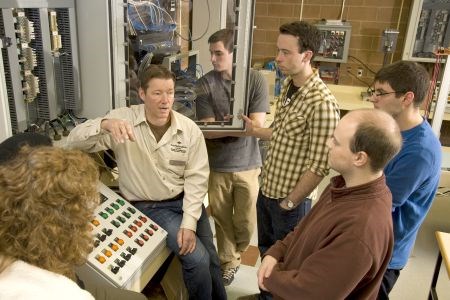Joe Vieira is hard-pressed to single out one technology program at Confederation College in Thunder Bay that he could classify as the most in-demand by employers.
“It depends on what day you ask me,” said the dean of the school of aviation and school of engineering technology and trades.
But he centres on three programs; instrumentation engineering technician, electronics engineering technician, electrical engineering technologist, that are creating the most buzz among potential employers.
“Last year, I had an engineering firm phone me during the week of graduation and he said he needed a whole host of instrumentation grads.”
He invited the company to come on campus and made its recruiting pitch directly before the class.
Vieira categorizes the ongoing cross-Canada shortage in many technology and skilled trades areas as “severe” due to a combination of baby boomers retiring and a plethora of industrial projects and construction activity occurring in northwestern Ontario, Alberta and Saskatchewan. New mines are poised to start development in Atikokan, Geraldton, Fort Frances and in the James Bay lowlands.
“It's not a secret to anyone and it's starting to become more aggravated,” as the resource economy in northwestern Ontario begins to kick into overdrive.
Like many Ontario colleges, Confederation is seeing major demand from employers for graduates coming from the technology fields. Often they are snapped up as soon as they receive the diploma.
All three technology programs have similarities since first year students have a common core, before they branch off into their respective specialty areas, but the two-year instrumentation engineering technician, Vieira said, offers a wide range of job opportunities in mining, pulp and paper, power generation, oil production and in the engineering fields.
“It involves anything that deals with measuring and controlling equipment, and it's all computerized,” said Vieira, who mentions Ontario Power Generation, Hydro One, Bombardier, Genivar, AbitibiBowater (now Resolute Forest Products) Vale, Placer Dome, TransCanada Pipelines and NavCanada among the employers who've been knocking on Confederation's door.
A few graduates have even segued into the industrial sales and service field because of their training and familiarity with instrumentation.
In the class demographics, Vieira finds that more than half of the technology students are mature tradespeople who have returned to college for retraining offered through the provincial Second Career program.
What's troubling is just shy of 50 per cent come directly from high school.
In his introductory greetings to students, Vieira finds he's increasingly speaking to a shrinking base of young people as the population of northwestern Ontario steadily declines. “We're closing high schools up here.”
And despite industry's desperate need for workers, Vieira said there is a “disconnect” in convincing young people to train for high demand occupations.
Confederation's instrumentation program is at 60 per cent capacity, while the electronics technician and electrical technologist classes range between 70 and 75 per cent capacity.
“We have empty seats,” said Vieira. “I can take more students. “
Technology graduates are collecting big dollars straight out of school.
A 2010 survey conducted by the Ontario Association of Certified Engineering Technicians and Technologists indicated that a college technician or technologist diploma leads to a mean salary of $70,510.
Through student tracking, Confederation program coordinators find that 95 per cent of their graduates are securing work in their chosen field, mostly in Ontario.
“We do a lot of promotion of programs,” said Vieira. “Our coordinators and faculty are very active in trying to attract students, but we can't fill the seats.”
Increasingly, the college is turning to recruitment of Aboriginal youth, by far Ontario's greatest source of population surge, to work in the resource industry. Their home communities are often on the doorstep of where most of the North's future development will take place.
To ensure program curriculum stays current, Vieira said Ontario colleges are mandated by the province to work with industry partners. Most large and small businesses in Thunder Bay and the region have representatives sitting on Confederation's advisory committees.
“If there are curriculum changes, we run it by the advisory committees,” said Vieira. “We can't train for a specific company, but we can train for the industry.”




